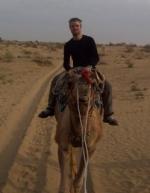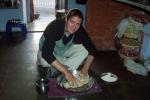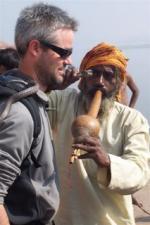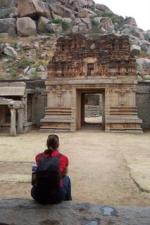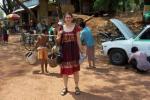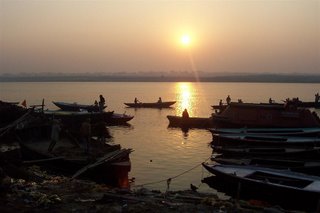
Sunrise on the Ganges. The Ganges is possibly the holiest place in all of India if not the whole world. Ironically, it is also the most poluted. Five hundred faecal coliform bacteria per 100 mL of water is considered safe enough for bathing. Samples from the river indicate more than 1.5 million bacteria per 100 mL of Ganges water.
We took off through the thick fog of Kathmandu's outdated airport with Air India- an airline which tops the black list on travel advisory websites. We flew this company using the same dubious logic of most Air India customers: "hell, it's got to be safer than the bus !"
Perhaps because Nepal is India's smaller and less famous neighbour, or perhaps because most people visit Nepal after India, Nepal is forever compared with respect to India. They always say the same thing: "Nepal is like India, but different". We, of course, went to Nepal first and will forever see India with respect to Nepal. Here is our first impression:
India looks a bit like Nepal- there are cars, goats, and cows bustling about to the sound of honking horns in a kind of street havoc. BUT, India's is a paved havoc. That, and the cows are bigger. They're huge ! Cows in Nepal are poor, emaciated, mangy little beasts. Cows in India are rich, fat, robust bovines with massive horns often seen chasing naked children off the road. Otherwise, India looks like Nepal. In time, this first impression will be proven wrong. Nepal and India are utterly different, and don't believe anyone who tells you this "same but different" nonsense. The Nepali people, of course, know that they are not Indian and, to avoid any possible confusion, they actually invented their own distinct time-zone exactly 15 minutes ahead of India's.
After landing in India and setting our watches straight, we caught a pre-paid taxi service which navigated us successfully through the chaos to drop us off near Varanasi's old town. From here, we spent a long time haggling with a shabby rickshaw tout and came to an agreement which neither of us understood completely. This is the first among many similar experiences we will encounter throughout our India travels. Prior to coming to India, I had never met an Indian without a fluent, Abu-accented, command of my language. Furthermore, language was never a significant barrier in Nepal. Thus, we were a bit surprised to find that the majority of Indians on the budget-travel circuit do not, in fact, speak much English.
After getting about halfway to our desired destination we had a heated altercation with our rickshaw tout over something neither party understood and had to elbow our way out of the gathering crowd of curious on-lookers. We then wound through the impossibly old and narrow streets of Varanasi, our massive backpacks scraping a layer of grime off the crumbling plaster walls, desperately looking for the Ganges. We couldn't find it. Worse still, we made the mistake of asking one of the locals for directions. Attempting to capitalize on the commission racket, our new friend tries taking us to several guest houses before finally dropping us off near the river and demanding five rupees baksheesh for his service. After refusing, we are chased out of the old city and stumble inadvertently onto a dark and smoky ghat full of dead bodies burning in the night. Apprehensively, we approach the fiery pyres and are surprised to find ourselves so close we can see a leg, a foot, toes. An arm burns off and falls to the ground. A man in a dirty white turban is attempting to to put it back on the pyre. He can't manage it- instead, he chases the severed limb around the ground with two sticks, trying unsuccessfully to pick it up.
Katlijn begins to feel a little queasy at this sight, so we head straight for our desired guest house, chosen because it is perched strategically above one of the Ganges' famous ghats. Within minutes we are already haggling over the inflated price of a room barely big enough to fit the bed, with one tiny screen window too dirty to let in any light but still having enough holes to leak in a steady stream of mosquitoes and the ashy smoke emanating from the corpses below. It's late and we are too tired to explore other options, so we roll out our sleeping bags and try to get some sleep.
In Varanasi, the monkeys come out at night.
When I was in Nepal, I used to think the monkeys were cute, funny, fuzzy little creatures providing hours of entertainment and plenty of atmosphere. Now I hate the little monsters. They begin by performing what sounds like a late-night tap dance on the corrugated roof of our budget accommodation. As the show reaches its climax, things get out of hand and, from the subsequent screeching, clawing, and scampering, I gather that a giant monkey fight breaks out. As more and more monkeys pile on each other above us, the whole roof shakes and rattles.
Then the dogs start.
Egged on by the brawling, roof-top, monkeys. First one. Then two. Then a hundred. All the dogs in Varanasi are barking at the monkeys, and then at each other, and then just for the sake of barking. Varanasi turns into a nighttime zoo of canines and apes all trying to out-bark each other. The barking induces aggression and I find myself imagining poking a small rifle through the holes in the screen window of our strategically located sniper position, gunning down the unsuspecting mutts. For Katlijn, the situation is worse. The constant yapping becomes so irksome it seeps into her sub-conscious so that when she finally falls asleep, she actually dreams of violently bludgeoning helpless puppies with a blunt object.
Then the bongos start.
Thump. Thump. Thump-thump-thump. At first, the holy man's drums are barely audible above the symphony of animal noises outside. But once you notice it, you can't stop listening. Thump. Thump. Thump-thump-thump, made more obtrusive by its irritating childlike simplicity, it consumes my very being until the incessant thumping becomes a roar above the howling monkeys and yelping dogs, driving me slowly madder, until I want to throw open the shutters of the dirt-stained windows onto the choking Ganges, inhale a lung full of ashes mixed with dead body smoke, and bellow out over the flaming corpses,
"Oi, Bongo man ! Shut up ! We're trying to sleep !"
But I don't do this. Instead, I lie awake in my bed listening, unable to stop myself, to the ceaseless thumping, imagining myself taking one of those Tibetan horns, big as a python, positioning it right next to the bongo-playing sadhu, and exhaling with all my might into its sonorous chamber generating a massive, deafening, horn blast. I would then casually glance over at the sadhu's frail frame, like I never noticed him before, and say politely,
"Oh, I'm sorry about that, Mister Bongo Dude. It's my religion"
And with only that explanation, I proceed to let loose another thunderous honk. HA ! Let's see you bongo over that, bongo boy !
Needless to say, I didn't get a lot of sleep. Dreary-eyed, we clamber down to the dingy cellar of our low-budget accommodation for breakfast. The grumpy chef emerges from his dark kitchen: a fat, balding Varanasi resident with a perpetually tired look on his face and huge bags under his eyes, the product of whole generations of screeching primates. He slowly fumbles around on the table looking for the menus, then throws them at us across the room so they land on the table with the pages fluttering open. After disappearing into his kitchen for ten minutes, he re-emerges and we tell him our order. The cook doesn't speak a word of English, not even the words "pancake" or "banana", so he motions us to write it down on a notepad before returning back to his kitchen. After some time, he re-emerges and studies our hand-written order disapprovingly, scanning it for errors, until finally, he finds one. Thrusting his stubby finger up and down on our notepad he says, "room number", and disappears again.
Naturally, it was quite a while before we received our breakfast and left the confines of our tiny stifling room to emerge onto Varanasi's hazy river-side ghats. We are immediately approached by touts, trying to take me for a boat ride, trying to get me into their shop, trying to stick a long thin medieval-looking implement into my ear to get the "best ear cleaning, no problem, I give you good price !" By the time we reach the main ghat, touts are coming at us from all sides with their hands outstretched,
"Hi ! Hello ! Where are you from ?", one grabs my hand, "Canada ? Good country. My brother is from Canada. Lot's of Indians in Canada", but rather than shake my hand, he is squeezing it about painfully.
I try to pull away, he holds on.
"No problem, I give best massage, good price", I watch helplessly as he manipulates my fingers into obscene gymnastics. Finally, with Katlijn's help and using my other hand, I manage to wrench free from his iron grip, but it's too late:
"Five rupees," he demands.
Trying to escape this tout, we walk briskly away towards an aged sadhu sitting cross-legged on the stairs beckoning us toward him. Surely no tout will bother us around this respected holy man. He is wearing a tray full of variegated colours into which he dips his finger and places a saffron tikka on my forehead. At first, I naively thought this was a kind blessing, but then he demands five rupees baksheesh- our would-be saviour turns out to be just another tout in sadhu's clothing.
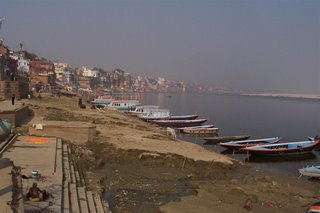
View of Varanasi's ghats in the haze. The turqoise boats on the right can be used for transportation between the various "ghats", or steps leading down to the river for bathing.
Even the children are in on it. A young boy and his brother picked us up for a boat ride to watch a nightly dance festival from the water. When he dropped us off again, he tried to double our originally agreed upon price based on a fabricated misunderstanding. When we walk off his boat and refuse to pay him anything extra, he yells at us "bad karma !" This is initially laughable until I stop to think about it, and it occurs to me that an eight year old kid just told me the Hindu equivalent of "go to hell !"
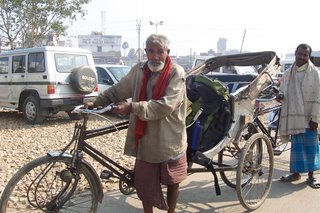
This rickshaw driver, shown with his tree-wheel rickshaw and my backpack, offered me a ride to the station in his helicopter.
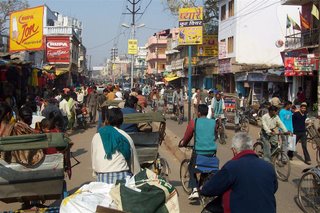
Main street Varanasi. You should see this place at rush hour !
By nightfall, I needed to get back to our guest house so I ask the nearest rickshaw driver to take me to the main ghat. Like all cycle-rickshaw drivers, mine is thin, dressed in rags, and destitute. Happy to get my business, he smiles revealing a row of sickly red teeth, rotting away from a life of chewing paan. Paan is a popular Indian digestive made from betel nut wrapped in a leaf. Unfortunately, betel nut is both cancerous and mildly narcotic so that many Indians consume it like chain smokers leading to ruddy, rotting teeth- an affliction which has reached epidemic proportions in Varanasi. Betel nut is illegal in most parts of the world outside of India.
Being peddled around Varanasi on a rickshaw by day is scary enough. Riding one at night is downright terrifying. The cars and trucks have only dim, often mal-functioning, headlights. It's hard to tell them apart from the motorcycles careening madly through the chaos. Cows don't have headlights. Monkeys don't have headlights. Everything you can possibly imagine is a potentially lethal obstacle. Nevertheless, my poor rickshaw driver, sweat dripping through his tattered rags, pedals as fast as he can. Periodically, he swerves violently to avoid a flock of chickens, a pothole, or a pedestrian seen just in time, and I have to hold on tightly as our rickshaw tilts on two wheels, the third spinning wildly in the air.
After a good half hour, we still don't arrive at the main ghat and I start wondering where we are, quickly coming to the conclusion that, wherever we are, it is not where I want to be. I tap my ragged, panting driver on the shoulder, and ask him "how much longer until we get to the main ghat ?"
He replies by trying to repeat what I said with a confused look on his face. He pedals to the side of the dark, busy road and stops the rickshaw. I ask again and he repeats again. After a few more of these exchanges, it quickly becomes apparent that his understanding of the English language can be summarized by only two phrases: "30 rupees" and "no problem"- enough to land him a client, but not quite enough to get him to where he needs to go.
By now, a large crowd of Indians gathers around me and my frail, betel nut addict- most of them just staring at me in awe, many engaging me in inane conversation "Hello ! Where are you from ? Canada ! Good country. My son lives in Toronto. Lot's of Indians there", but none having the requisite map reading skills I wanted.
After several futile minutes, trying to say the words "main" and "ghat" in as many ways as I know how, while each Indian individually puzzles over my map, some sort of group consensus is reached and everyone confidently points my rickshaw driver in a seemingly random direction, sending us peddling furiously, once more, through the night. My driver turns around, flashes me his rotting teeth and yells back "no problem", giving me absolutely no confidence whatsoever we are pointed in the right way.
After a long time, I can hear the cadence of my driver's peddling growing slower, his breathing growing heavier. I don't blame him- it's late and we've been travelling a long time. At some point, he points to a dark hole in the wall and asks, "hashish ? Marijuana ?" and I say, "No thanks". Nevertheless, he stops the cart anyhow and disappears into the hole leaving me sitting on his little rickshaw wondering if he understood my answer properly.
It isn't long before I'm approached by a nearby Indian (there is always a nearby Indian). "Hello ! Where you from ? Canada !? Great country. My cousin works in Calgary. etc." Fortunately, this one miraculously turns out to be a student at the University with perfect, Abu-accented English. We chat for some time before my driver finally emerges out of the dark hole in the wall with a joint hanging out of his mouth and a bong tucked into his loin cloth. I ask the Indian student whether he thinks my rickshaw driver will be able to get me to the main ghat.
The student assures me, "He's no good, but the ghats are just a few blocks from here so no problem." And with that, we are off once again, the scent of marijuana trailing behind my driver's smoldering weed as I wave back at the student thanking him for his help.
Indeed, it wasn't long before we finally arrived at the main ghat. Of course, my driver asked me for twice our originally agreed upon rate. However, I was too tired and happy to be back to give up much of a fight. I just paid him his money and waved goodbye to my stoned rickshaw wallah. He flashed me one last betel nut smile before finally pedaling out of my life and into the night.
I could already sense the presence of the hand massage touts nearby and was preparing myself for the inevitable gauntlet when, without warning, the power goes out and my surroundings descend into pitch blackness. Instinctively, I stick my hands deep in my pocket for protection, hoping to fool the masses of touts I know to be coming at me now from all direction with outstretched hands, desperate to give mine a good squishing. But it does no good, instead, my guard down, I feel a cold spot of paint dripping between my eyes which, slowly adjusting to the dark, can barely discern an old man's withered hand moving away from my forehead. "Fiver rupees", the tout in sadhu's clothing demands for his blessing.
I quickly learn that Varanasi's famous ghats are a death trap in the dark with no lights to illuminate the many holes, steps, and river side drop-offs. Slowly and carefully, I walk back towards my guest house. I can already hear the scampering monkeys preparing to begin their late-night corrugated rooftop tap-dance extravaganza which will begin the unstoppable chain events leading to a thousand barking dogs- another sleepless night. I begin to wonder:
Since when did I become afraid to ask people for directions on the street ?
When did I begin walking around in fear that somebody might try to shake my hand ?
Why are there twelve light switches in my room, and only one light bulb ?
What the hell is wrong with this place ?
On the way home, I pass by a real sadhu dressed in yellow and orange rags with a small sac containing a few coins. I give him a ten rupee note. "Thank you so much, and bless you" he says to me, and somehow I feel instantly better. A bit further, a young western woman wrapped in a warm pashmina waits for me by the river-side. When I approach she tells me she feels uncomfortable walking alone in the dark and asks me if I can walk her to the hotel. I don't blame her. As we walk along the Ganges together, I tell her about my rickshaw ordeal.
"Did he really not understand me ? Was he stoned ? Or was he just trying to scam me into paying more money ?" One never knows, we agree.
Back at my hotel, I over-hear some recently arriving tourists ruthlessly grilling the staff like suspected criminals, completely certain that they would somehow be scammed unless they spell out in great details every aspect of their agreement beforehand and write it down on paper, their misplaced anger giving them away as recent victims of Varanasi's shakedown.
That night, the monkeys took their show elsewhere, the dogs didn't start their chain-reaction barking, and even bongo man, god bless him, provided us with one night of blissful sleep. By morning, we had our order ready for the grumpy chef in neat block-letters with our hotel number clearly written on the top. When he emerged from his dungeon kitchen, he put both hands on the table, bent over our notebook, and studied the papers carefully for a long time while we waited anxiously. Finally, he made a low grunt of reluctant approval, eyed me suspiciously for a moment, and returned to his dark kitchen which soon emanated the sweet smell of banana pancakes. I discovered a new respect for this chef's grumpiness- I'd be grumpy too if all the tourists I baked pancakes for talked to me like a common thief. Whatever is wrong with this place, it is cyclic leading both visitors and locals alike to badger each other.
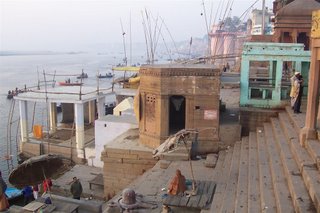
Varansi at morning time in gorgeous pastels.
Less tired, our stomachs full of banana pancakes, we set off to explore Varanasi again. Over the initial shock of so many people treating us like walking money bags, we focus our attention instead on the vast majority of people bathing and bustling about the ghats. There are rich people, poor people, old people, young people, holy men, hippies, body builders, kite flyers, cricket players, and any other sort of person you can imagine doing anything you can imagine: bathing, swimming, playing, rowing, eating, cremating, dancing, defecating, laughing, crying, singing, praying, meditating, and more.
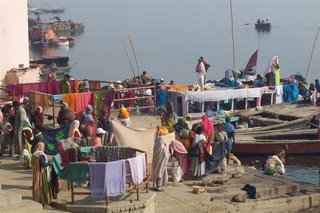
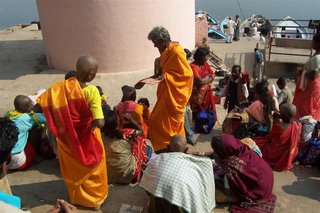
Colourful ghat-side characters. After cremating their deceased, Hindus will shave their heads and dress in white. Unlike in the west, white, rather than black, represents mourning.
As the days go on and we become use to life on the Ghats, the touts grow less and less prominent in the kaleidoscopic hubbub until they, too, are just another type of person, like any other, going about their business. In fact, we don't even notice the tourists. We know they must be somewhere, having chatted with them at our guest house and dealt with the touts that cater to them; India's tourist business is booming like never before. It is just that the tourists are a minority. Overwhelmed by the sheer number and variety of local people, they disappear completely into the crowd, replaced instead by a feeling of authenticity like no other place we have visited.
Varanasi is, of course, the final earthly destination for Hindu souls. Though many Hindus will not see Varanasi in their lifetime, it is most likely where they will come to die. It is, at very least, the most auspicious place to have your body cremated. Hindus believe that if your life expires in Varanasi, you will be immediately offered moksha, or liberation from the cycle of birth and death.
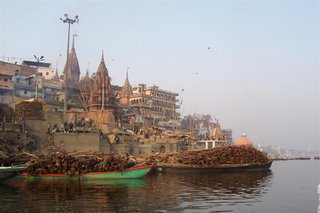
Not everyone can afford to burn their loved-ones near the Ganges: the priests, ceremony, and wood cost considerable sums of money. The wood is particularly expensive, and three different types are provided to accommodate a range of budgets. Those who can't afford wood can use a nearby electric crematorium, which is also significantly more environmentally friendly. However few people are willing to do this since wood is integral to Hindu cremation rites, providing a symbolic connection between the body and the earth.
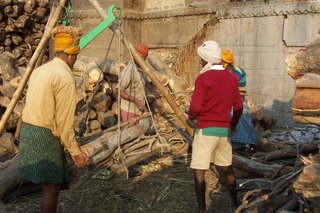
Given the high cost of wood, it is weighed carefully and sold by the kilogram. These people are experts in knowing exactly how much wood is needed to burn a given corpse.
The dead burn along the Ganges' ghats twenty-four hours a day. The Indian concept of a funeral is exactly opposite that of the West. Instead of a solemn and private affair around a body made artificially to look alive, the Hindu funeral is an entirely public spectacle set around a raw burning corpse. It is a place to contemplate death. While bodies are burning around you, there is a constant sound of ceremonies, drumming, and music filling the air which, combined with the many colours and varieties of people, creates a special mystical and spiritual atmosphere completely unique in the world.
Looking back on Varanasi, it was the highlight of our visit to the sub-continent: India at its most vibrant and irritating. It is simultaneously busy and peaceful, colourful and dark, magical and raw: exploding with life.
|




